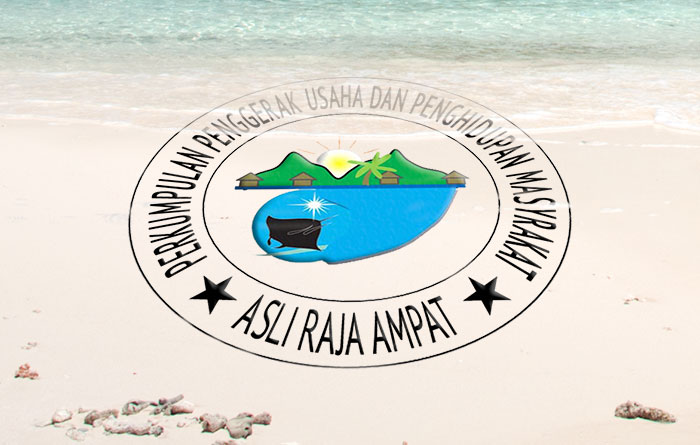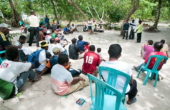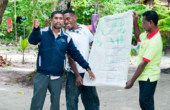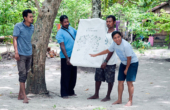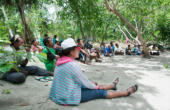The Raja Ampat Homestay Association (HSA) was originally formed in 2013 as Asosiasi Usaha Homestay Lokal Kabupaten Raja Ampat. (The Raja Ampat Local Homestay Business Enterprise Association.)
In order to provide a base from which a much wider range of social and business activities can be launched on behalf of local communities, the HSA reconstituted in 2018 as an incorporated, mutual-benefit community organisation, with the formal title Perkumpulan Penggerak Usaha Dan Penghidupan Masyarakat Asli Raja Ampat (PERJAMPAT: The Association of Indigenous Community Entrepreneurship and Livelihood in Raja Ampat).
The objectives of the Association are:
- Protect assets such as the sea and the land from the accumulation of rubbish, from the use of fish bombs and poisons, and from illegal logging.
- Protect and support local homestay business owners.
- Convene members around a common vision and mission.
- Sustain Raja Ampat’s culture.
- Strengthen the local economy.
- Improve education and skills.
The work of the Association is essential to:
- Support the aspirations of Raja Ampat’s Papuan communities.
- Provide expertise to and further develop the sustainability of the region’s Papuan-owned community-based tourism sector.
- Maintain the ability to to regularly inspect member establishments, provide mentoring and, where necessary, enforce compliance with the Association Membership Standards that guarantee guest service standards.
- Maintain the services provided to visitors by the Raja Ampat Homestay Information Center at Waisai harbour.
- Maintain delivery of the services provided to Association members and guests by the Stay Raja Ampat website.
Sustainable ecotourism in Raja Ampat
Local communities wholeheartedly embrace conservation of both their environment and traditional way of life. Conservation is enshrined in local customary law, and locally-owned ecotourism ventures are the foundation upon which international conservation efforts in Raja Ampat are based.
In the video below, Raja Ampat Homestay Association members tell the story of their front line role in preserving Raja Ampat’s globally important marine ecosystems.
Community support
The Raja Ampat Homestay Association is a true community based organisation and is keenly aware of the flow on effects of the success (or otherwise) of its members’ business ventures. Homestays are the focus of economic activity that supports a wide range of community members. In addition to the community members directly employed by the homestays, a wide network of local guides, suppliers, transport operators and service providers is dependent on the success of Raja Ampat’s homestay accommodation sector.
Recognition of this is evident in the Association motto: “Building the economy of the village.” The importance of this task extends beyond providing environmentally sustainable incomes to villagers themselves: Economic empowerment of local communities is the only way to ensure that customary landowners have the influence they need to counter the potentially disastrous effects of inappropriate government policy.
PT PERJAMPAT
In its role as an incubator of community businesses, the Homestay Association needed the ability to conduct business of its own. To that end, PT Bahari Perjampat Sejahtera (PT PERJAMPAT) was incorporated in January 2019. PT PERJAMPAT is the Indonesian equivalent of a Limited Liability Company, and is a true social enterprise, in that:
- All of PT Bahari Perjampat Sejahtera’s profits are either reinvested in the business, or are used to support community development and environmental projects implemented by the Homestay Association
- Company shares can only be held by members of the Homestay Association, and share ownership reverts to the company in the event that a shareholder ceases to be a Homestay Association member.
- Shares in the company do not yield a dividend, and neither can they be bought or sold.
As at July 2024, PT PERJAMPAT’s sole source of income is the 15% commission paid by guests for accommodation bookings made on the Stay Raja Ampat website. From that income, PT PERJAMPAT finances all the work of the Association described above.
Raja Ampat Homestay Association members
Homestays which are members of the Raja Ampat Homestay Association are monitored to ensure they meet Association standards.
Supporting homestays which are members of the Association means you’ll have no surprises regarding available facilities and services and that you’ll have the Association’s support in the unlikely event of a problem that you can’t otherwise resolve.
What are the Raja Ampat Homestay Association standards?
The HSA Standards assessment examines five separate categories of homestay operations.
Assessment includes such things as social impact and obligations, gender equality, environmental impact and environmental sustainability. The five categories are assessed via 29 criteria having a total of 75 specific indicators.
Some indicators of most direct concern to guests include:
- Specific minimum standards for accommodation facilities
- Specific minimum standards for bathroom/toilet facilities
- Environmental impact
- Homestay cleanliness and waste management
- Homestay food and food preparation hygiene
- Minimum certified training of guides for hometays with diving operations
- Adherence to the Raja Ampat Diving Code of Practice
So does Stay Raja Ampat only list Association member homestays?
Yes.
As of January 2020, the area serviced by the Association extends from Batanta in the south to the north coast of Waigeo and westward to include Gam, Mansuar, The Pam (Fam) Islands, Piaynemo (Penemu), Manyaifun, Kawe and all the locations between those islands.
Why?
The Raja Ampat Homestay Association performs an essential role in creating the economic and social conditions necessary for local communities to retain ownership of their traditional lands and culture in the face of ever increasing development pressure.
HSA/PERJAMPAT membership is open to all locally-owned homestays, and a unified community approach and an agreed set of standards for all will best ensure the success of the conservation effort in Raja Ampat.
PERJAMPAT is a fully self-funding community organisation. The income required to provide member services (which include provision of the Stay Raja Ampat website) are generated by the commission levied on website sales. It’s only fair that businesses benefiting from PERJAMPAT’s services are members of the organisation providing those services.
But I’ve heard that the HSA is some kind of exclusive club or price fixing cartel?
Sigh… It most certainly is not!
Homestay owners recognise that there needs to be room for innovation, in order to ensure that services are designed around the needs of guests rather than those of the proprietors. Therefore the Association does not set or recommend prices for homestays or any other ecotourism operators. Please read this Raja Ampat Accommodation Prices article for an in-depth look at the factors affecting costs and fuel supplies in Raja Ampat.
Here’s an extract from a comprehensive report about the HSA. We hope it will put such notions to rest!
The Raja Ampat Local Homestay Association currently represents just over sixty family-owned businesses. These are not private individual businesses, but family entities, similar to a traditional joint stock company, that support and employ an extended network of relations. The Association is now the largest community-owned business grouping in the Indonesian provinces of Papua and West Papua. First concentrated around the islands of Mansuar and Gam in the Dampier Strait, the Association’s membership is spreading to include communities from other parts of Raja Ampat such as the Fam islands, western Waigeo and the island of Batanta. The Association’s members understand that their businesses depend on the integrity of their environment. They believe that they and others in their communities are best positioned to protect that environment, and that their businesses give them the means to do so: “It’s obvious isn’t it? As more homestays start up in places under greatest threat from bomb fishing – such as Batanta and western Waigeo – less of it will happen. There will be more of us around to keep watch as we go about our business, and we will not need to be paid to patrol. Who would dare bomb the reef around Mansuar now?” The Association mobilises technical assistance and funding for business skills training and mentoring for its members. The Association also provides certain business services to its members such as online promotion and bookings, and it manages government relations on issues such as the management of MPA entrance fees. The Association is setting standards on diving, transport and hospitality to govern the conduct of its members’ businesses. It is currently working to adapt and apply the Global Sustainable Tourism Criteria (GSTC) to the homestay sector. The Association is also a social movement motivated by the desire to prevent family land being sold to resorts and to stand on their own feet as economic actors. “Homestays are our way to defend our land… we do not want to be bystanders or someone else’s workers”. The pain that people feel when they have lost land remains the single most important factor in motivating people to set up the Homestay Association. The Association is a community organization that, for the first time, gives people from multiple communities their own, shared space to discuss their lives and businesses; and also to find solutions to the problems that most concern them, such as waste management, illegal fishing, illegal logging, and the loss of culture and identity. As such, the Association fills an institutional vacuum. With the possible exception of the church there is, at present, no other structure at community level that regularly convenes people from different villages in order to talk about matters that are too big for each village to address on its own. The Association is inspiring youth. Over half its management team are in their twenties and thirties and represent a new generation of community leaders that could serve Raja Ampat for the next forty years. The opportunity to work for the family business means that youth now want to come home after completing their studies. Much of the money that their families’ homestays generate now pays for their younger sisters and brothers to also go to college. The words of one young homestay owner reflects how others of his generation now think: “I hope other people in the community can build a business like this one. I hope that outsiders do not take over this small place. The future I wish for is that my community will always stay here and make its living from this place.” The Association is empowering women. The Association understands that it will fail if men and women cannot work together. The Association’s most energetic managers are now women. They are the glue that binds the Association’s membership, and are organising other women in their villages to set up kiosks and a market for local organic produce to keep homestays supplied. Their example has transformed the outlook of women in the community. One said, “All my life I have looked at this kitchen, I never knew life could be more than this”. The homestay sector is therefore serving, not only to protect the marine environment, but also to regenerate community. Where this serves to build a supporting system of extended family and other social relations then it reinforces the likelihood that conservation will succeed. “Redefining conservation: how communities in Raja Ampat are shaping their world, and what their experience teaches us about empowerment.” Dominic Elson, Maria Latumahina & Adrian Wells |
A vision for life in Raja Ampat
PERJAMPAT has articulated the hopes and aims of local communities in their Vision Statement. You can read it here.
2017 UNDP Equator Prize award
The Homestay Association’s success in advancing local nature-based solutions for sustainable development was recognised by the United Nations Development Programme 2017 award of an Equator Prize.
See the highlights of the Equator Prize NYC events in this video, and read more about 2017’s other winning community groups here.
